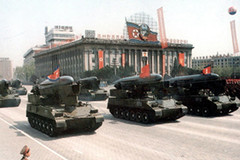
The western imperialist countries have accused the Democratic People's Republic of Korea (DPRK) of using satellite technology for nuclear weapons research.
Originally uploaded by Pan-African News Wire File Photos
11:55 Mecca time, 08:55 GMT
Three-way summit on N Korea begins
The trilateral summit seeks to woo North Korea back to nuclear disarmament negotiations
China, Japan and South Korea have begun talks in Beijing amid signs that pressure on North Korea to rejoin nuclear disarmament negotiations may be yielding results.
The talks come as Wen Jiabao, the Chinese premier, prepares to brief his Japanese and South Korean counterparts on a recent meeting he held in Pyongyang, North Korea's capital.
During the meeting, Kim Jong-il, North Korea's president, told Wen that his country may end its boycott of the talks, depending on its negotiations with Washington.
North Korea pulled out the negotiations after it was condemned for conducting a rocket launch in April and nuclear test in May.
The US has yet to publicly respond to the North's apparent overture.
The talks involve China, Japan, the two Koreas, Russia and the US.
Xia Yeliang, a professor of economics at Peking University, said the three countries would also likely discuss the strengthening of the Asian economy.
"China would like to use the negotiating tabe to persuade its two partners to work together on free trade and against US pressure in the future; to be more independent so that Asian economies can share a larger segment of the world economy," he told Al Jazeera.
"The three countries would have the common goal of making the entire Asian economy more independent in the global economy. In that way they can work on a regional currency - the Asian dollar - for the future."
'Resolution working'
Japanese officials said late on Friday that the US had indicated it might hold talks with North Korea and that Pyongyang appears increasingly willing to return to the talks.
"It can be said that the resolution is working to convince the DPRK [Democratic People's Republic of Korea] that it can't go on like this. It must return to the six-party talks," Kazuo Kodama, press secretary to Katsuya Okada, the Japanese foreign minister, said on Friday.
Pyongyang, under sanctions imposed after the rocket launch and nuclear test, had earlier insisted it would never return to the talks.
Kim's offer of dialogue appears to reflect the North's keenness for direct engagement with Washington - a perennial demand.
Yukio Hatoyama, the Japanese prime minister, and Lee Myung-bak, the South Korean president, said on Friday they agreed the North should not be given aid until it begins to dismantle its nuclear weapons programme.
"We should not resume any economic assistance unless North Korea shows commitment and takes concrete steps" towards nuclear abandonment, Hatoyama said at a joint news conference with Lee.
He has backed a proposal by Lee to offer a one-time "grand bargain" of aid and concessions in exchange for denuclearisation as opposed to the step-by-step process pursued over the past six years.
But winning China's overt support for such an approach may be difficult given its longtime support for North Korea, although that role gives Beijing relatively stronger influence with the North, its imporverished ally.
Planned visit
A South Korean diplomat said North Korea is pushing to send Ri Gun, its deputy nuclear envoy, to the US later this month for a private security forum.
He asked not to be identified because the forum's organisers have not announced details of the session.
The planned trip raises speculation that Ri could meet US officials to set the stage for possible direct talks with Washington.
PJ Crowley, the state department spokesman, said on Friday that non-governmental organisations had invited Ri to participate in meetings in the US.
He said, however, that no decision has been made yet "whether to approve that travel".
Source: Agencies
No comments:
Post a Comment